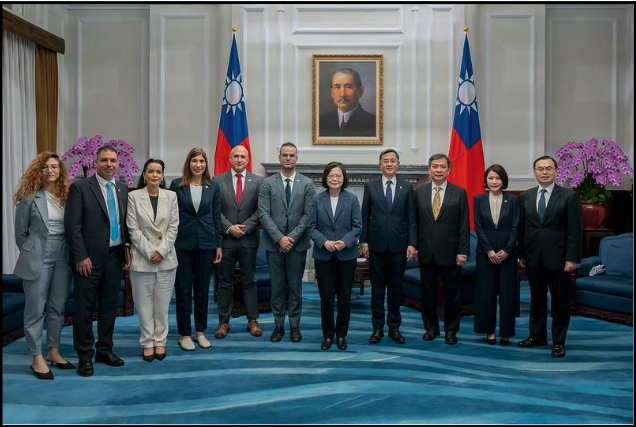Introduction
Taiwan has long been an important geopolitical player in international decisions regarding economic security. The island nation draws attention for its importance to the Indo-Pacific, its economic prowess in technology—especially semiconductors—and its complex relationship with China. Much of the ongoing discourse on Taiwan’s foreign relations focuses on its diplomatic isolation or trade partnerships, leaving Taiwan’s defense and security cooperation with Middle Eastern nations unexplored. While Taiwan has enjoyed limited formal diplomatic ties with the region, in contrast to the partnerships that China has developed, shifting geopolitical dynamics and technological advancements now pave the way for deeper military and cybersecurity collaboration.
The Middle East is currently subject to a period of rapid defense modernization, particularly in Gulf states such as Saudi Arabia and the United Arab Emirates (UAE). These nations are investing heavily in military technology, artificial intelligence, and cybersecurity. Additionally, Israel remains a dominant force in defense innovation, benefiting from significant US military support. While Taiwan lacks formal diplomatic recognition from most Middle Eastern states, there is increasing evidence of informal cooperation, including defense partnerships.
This article will examine the evolution of Taiwanese-Middle Eastern relations by focusing on arms trading, intelligence sharing, and cybersecurity. It will also explore Taiwan’s contributions to global military technology—particularly through the semiconductor industry—and how these developments are influencing Middle Eastern defense strategies. Furthermore, this article will integrate the role US policies play in furthering the relations between the two regions. Through analyzing existing trade agreements, diplomatic outreach, and emerging security collaboration, this article will expand upon a dimension of Taiwan’s global strategic alignment that ties together with the Middle East’s burgeoning geopolitical role.
Taiwan’s History of Diplomacy in the Middle East
Taiwan, officially known as the Republic of China (ROC), saw a period of formal diplomatic connection with numerous Middle Eastern powers in the late 1950s, such as Iraq, Turkey, Iran and Jordan. This diplomatic connection was inspired by concerns over the spread of communism and shared strategic interests.
In October 1971, the People’s Republic of China (PRC) replaced the ROC as China’s representative to the United Nations. Following this change, Taiwan lost the diplomatic recognition of most international organizations and by the early 1990s, the country no longer maintained any formal diplomatic relations with any Middle Eastern states. However, Taiwan has continued to maintain unofficial economic and cultural offices in numerous countries such as Israel, Saudi Arabia, Turkey, the UAE, and Bahrain, for the purpose of trade and technological cooperation.
From 1946 to 1990, Saudi Arabia and Taiwan maintained a strategic partnership. Saudi Arabia supplied stable energy supplies and financial loans to support Taiwan’s infrastructure development. On the other hand, Taiwan sent skilled professionals to assist in Saudi Arabia’s modernization efforts. In the case of Israel, while the country offers no diplomatic recognition, bilateral cooperation has grown significantly since the 1990s. The establishment of the Taipei Economic and Cultural Office in Tel Aviv (1993) and Israel’s reciprocal presence in Taipei marked the beginning of formal engagement between the two nations. Since then, Taiwan and Israel have signed over 30 trade agreements, covering fields such as high-tech industry collaboration, artificial intelligence, e-government, and water resource management.

Image: President Tsai Ing-wen met with an Israeli parliamentary delegation in 2023.(Image source: Office of the President, Republic of China [Taiwan])
Taiwan-Israel Ties in Cybersecurity and Military Technology
Taiwan and Israel have expanded their cooperation into defense technology and cyber security since 2006, with a focus on biotechnology, space research, and electronics. Taiwan has been particularly interested in Israeli defense innovations, especially in fields such as aerospace, radar communication, and cyber warfare. While there is a lack of official documentation and information on intelligence sharing between Taiwan and Israel, evidence suggests that the countries have exchanged expertise in countering cyber threats and developing military grade cybersecurity systems. Given the increasing prevalence of cyber warfare, these intelligence-sharing agreements between Taiwan and countries like Israel have been opened in order to address mutual security concerns. Both nations face persistent geopolitical threats—Taiwan from China and Israel from regional adversaries—and this has encouraged greater cooperation in protecting critical infrastructure in military applications.
At the same time, the United States of America remains an important factor in the Israel-Taiwan relationship. [1] The US-Israel relationship indirectly influences Taiwan, as both Israel and Taiwan rely on US security support and advanced military technologies. [2] Taiwan has studied Israel’s defense strategies, including the use of missile defense systems (e.g. the Iron Dome) to enhance its own security posture.[3] Notably, Taiwan’s primary competition for certain defense systems has not been Ukraine, but large buyers in the Middle East. Though Taiwan does not receive US military aid at the same level as Israel, its strategic alignment with the US defense sector has allowed it to benefit from the shared research and emerging security technologies.
Taiwan’s Defense Industry and Military Technology Exports to the Middle East
Taiwan has been a notable contributor to the Middle Eastern defense sector, exporting technologies such as drones, naval systems, and surveillance equipment to countries like Saudi Arabia and the United Arab Emirates (UAE). Saudi Arabia stands as Taiwan’s largest trading partner in the Middle East, with an annual trade volume exceeding USD 12 billion. In 2020, both nations signed a tax treaty to prevent double taxation, effective from 2022, with the focus of streamlining bilateral trade and reducing tax burdens for businesses in both countries.
Taiwan’s dominance in the semiconductor manufacturing industry plays a pivotal role in global defense technologies. Producing over 60 percent of the world’s semiconductors, Taiwan’s industry is integral to various military applications, including advanced computing and artificial intelligence (AI) systems. This industry edge positions Taiwan as a strategic partner for Middle Eastern nations seeking to enhance their military capabilities through AI integration.
Given the increasing prevalence of cyber warfare, intelligence-sharing agreements between Taiwan and countries like Israel have been opened in order to address mutual security concerns. Both nations face acute security threats and have pursued policies of technological innovation as a means of national defense.
Beyond military and technological collaborations, Taiwan’s engagement with Middle Eastern countries extends into economic dimensions. Sovereign wealth funds (SWFs) from the Gulf states have shown interest in investing in Taiwan’s high-tech industries, including semiconductor manufacturing. This could lead to an increase in knowledge transfer and skill development within the different economies, therefore contributing to the broader societal development in both regions.
Risks in Taiwan-Middle East Engagement
While an expansion into the Middle East offers strategic advantages for Taiwan, it also entails certain risks. Taiwan’s involvement in regional conflicts, even indirectly, can lead to diplomatic tensions and unintended consequences. An example of this are the recent reports of Taiwan-manufactured pagers allegedly used by Israel’s Mossad in operations against Hezbollah. According to sources, explosives were planted inside 5,000 Taiwan-made pagers, leading to casualties and escalating regional tensions. This incident has drawn significant attention from Taiwan’s national security agencies and has raised geopolitical tensions further.
Meanwhile, Taiwan has faced a challenge in one of its humanitarian and infrastructure projects in the Middle East. The Taiwan-Reyhanli Centre for World Citizens, a refugee facility in Turkey, was initially established with the aim of assisting displaced Syrian refugees. However, reports have surfaced alleging that the camp may be linked to money laundering activities, raising concerns about financial transparency and Taiwan’s humanitarian diplomacy.
Conclusion
Taiwan’s evolving defense relationships with Middle Eastern nations illustrate a complex interplay of economic, technological, and strategic considerations. While Taiwan remains diplomatically isolated in the region due to pressure from China, its defense industry has quietly expanded its influence through arms exports, cybersecurity partnerships, and semiconductor technology integration. Taiwan’s engagement with key Middle Eastern players—including Saudi Arabia, the UAE, and Israel—demonstrates its capacity to contribute to regional security and technological advancements, particularly in AI-driven military applications.
At the same time, the role of US defense policies remains crucial. American military assistance to Taiwan shapes its defense capabilities and export restrictions, while Washington’s strategic alignment with Israel has indirect consequences for Taiwan’s security posture. Additionally, other Western nations, such as the United Kingdom and Canada, have maintained significant defense partnerships in the Middle East, but their direct support for Taiwan remains limited, focusing instead on diplomatic engagement and economic collaboration. Beyond traditional defense exports, Taiwan’s dominance in semiconductor manufacturing has become a key factor in its global strategic value. Middle Eastern nations, eager to develop domestic AI and military tech industries, are seeking Taiwan’s expertise. While some argue that Taiwan’s semiconductor industry should not dictate foreign defense policies, its role in critical supply chains remains an undeniable factor in shaping international security dynamics.
While this article has explored Taiwan’s expanding defense footprint in the Middle East, several areas warrant further research. One key area is Taiwan’s potential role in the military modernization efforts of Gulf states, particularly within Saudi Arabia’s Vision 2030 initiative. As Gulf nations seek to develop indigenous defense industries, Taiwan’s expertise in AI, cybersecurity, and semiconductor technology could become even more relevant. Additionally, further research could explore the impact of sovereign wealth funds from the Middle East on Taiwan’s defense and technology sectors. With countries like the UAE and Saudi Arabia investing heavily in global technology firms, Taiwan’s position as a tech leader could lead to new forms of collaboration beyond direct arms sales.
Finally, the broader geopolitical implications of Taiwan’s Middle Eastern engagement should be examined more fully in light of China’s expanding presence in the region. As Beijing strengthens its economic and security ties with Gulf nations, Taiwan’s ability to maintain and grow its partnerships in the region remains a key question for future research.
The main point: Despite the lack of formal diplomatic relations, Taiwan’s engagement with key Middle Eastern players—including Saudi Arabia, the UAE, and Israel—demonstrates its capacity to contribute to regional security and technological advancements, particularly in AI-driven military applications. Further research in Taiwan-Middle East relations could focus on Taiwan’s potential role in military modernization or the impact of sovereign wealth funds from the Middle East on Taiwan’s defense and technology sectors.
[1] Congressional Research Service, “U.S. Foreign Aid to Israel,” Report R46463, July 2022.
[2] Ibid.
[3] Ibid.



